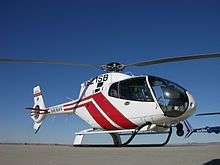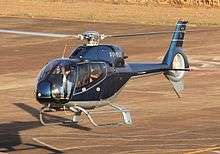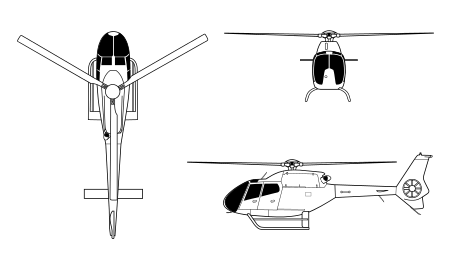Eurocopter EC120 Colibri
| EC120 Colibri HC120 | |
|---|---|
 | |
| EC120B | |
| Role | Light utility helicopter |
| National origin | France/China |
| Manufacturer | Eurocopter Airbus Helicopters Harbin Aircraft Industry Group |
| First flight | 9 June 1995 |
| Introduction | 1998 |
| Produced | 1995-present |
| Number built | over 550 |
| Unit cost | |
The Eurocopter (now Airbus Helicopters) EC120 Colibri (Hummingbird) is a five-seat, single-engine, light utility helicopter. Jointly designed and developed by Eurocopter, China National Aero-Technology Import & Export Corporation (CATIC), Harbin Aviation Industries (Group) Ltd (HAIG) and Singapore Technologies Aerospace Ltd (STAero) at Eurocopter France's Marignane facility, the EC120B is assembled by Eurocopter in France and Australia.[3]
In China, the aircraft is produced by Harbin Aircraft Manufacturing Corporation (HAMC) as the HC120.[4] In 2004, HAMC began local manufacturing of the HC120 at their assembly line in Harbin, in northern China. In the Chinese market, both the People's Liberation Army and multiple local police forces have purchased HC120 helicopters. [5]
Development
The EC120 Colibri has its origins in the P120, a proposal by French helicopter manufacturer Aérospatiale that was intended to replace both their Aérospatiale Gazelle and Aérospatiale SA 315B Lama single engine helicopters. During the 1980s, Aérospatiale sought international partners with which to co-produce the P120, these included aerospace companies in China, Singapore, and Australia.[6][7] In the aftermath of the Chinese Government's crackdown on the Tiananmen Square protests of 1989, the exclusion of Chinese involvement in the project was speculated.[8]
On 20 October 1992, a contract for the joint development contract of the new helicopter was signed by the three principle partners of the project, the newly formed Eurocopter, China National Aero-Technology Import & Export Corporation (CATIC) and Singapore Aerospace Ltd (STAero).[9] Under the joint development agreement, Eurocopter received a 61% controlling interest and technical leader in the programme, CATIC received a 24% work share and STAero received a 15% work share; CATIC designed and produced the cabin structure and fuel system, STAero produced the tail boom, access doors, and composite materials, while Eurocopter produced the dynamic assemblies, installed the avionics, electrical and hydraulic systems, and conducted the final assembly activity.[10] Development of the rotorcraft allowed Eurocopter to extend its range to include 1.5 metric-ton rotorcraft.[9]
_03.jpg)
On 9 June 1995, the first prototype EC120 Colibri conducted its maiden flight.[9] By February 1996, the prototype had accumulated 60 flight hours, a second prototype joined the test program later that year.[11] In February 1997, the EC120 Colibri was formally launched at the Helicopter Association International (HAI) show in Anaheim, California;[12] by June 1997, more than 50 orders had been received for the type.[13] By October 1998, more than 100 orders had been received for the type, leading Eurocopter to increase the production rate from four helicopters per month to six.[1] In 2002, Eurocopter was in the process of establishing a second assembly line for the EC120 at Australian Aerospace's facility in Brisbane, Australia.[14]
In September 2003, Eurocopter and China Aviation Industry Corporation II (AVIC II) expanded their partnership agreement to include a co-production arrangement with AVIC II-subsidiary Harbin Aircraft Industry Group (HAIG).[15] On 11 June 2004, a final production agreement was signed; under the agreement, CATIA and HAIG received exclusive market rights in China, and Eurocopter agreed to stop selling French-built EC120s in mainland China.[16] In June 2014, the People's Liberation Army of China became the launch customer for the Harbin-produced HC120, reportedly placing an order for eight of the type with options for fifty more.[16]
Diesel demonstrator
Within the Green Rotorcraft European Clean Sky Joint Technology Initiative environmental research program started in 2011, a H120 Technology demonstrator equipped with a HIPE AE440 high-compression aircraft diesel engine, running on jet fuel, first flew on 6 November 2015.[17] It aims to reduce pollutant emissions and increase fuel efficiency, nearly double the range and enhanced operations in hot and high conditions.[18]
The powerplant is a liquid-cooled, dry sump lubricated 4.6-liter 90° V8 engine with an 1800 bar common rail direct injection, fully machined aluminum blocks, titanium connecting rods, steel pistons and liners, one turbocharger per cylinder bank.[18] With an air/air intercooler, it weighs 197 kg (dry) without gearbox and the 330 kW (440 hp) installed powerpack weighs 249 kg.[17] The rotors are driven via the existing transmission, the faster-turning Turbomeca Arrius turboshaft is replaced with a multiplier gearbox.[19]
Its brake specific fuel consumption is 200 g/kW.h.[20] Torque oscillations are reduced through a light torsional shaft and vibrations are damped by Silent blocs.[21] It is manufactured by Teos Powertrain Engineering - a joint venture between Mecachrome and D2T (IFPEN group) - for the mechanical design, engine main parts manufacturing, assembly and testing and Austro Engine for the dual channel FADEC and harness, fuel system, airworthiness.[17] Power is maintained at 2,500m and ISA+20° and it achieved 42% fuel consumption reduction, reducing the direct operating costs by 30% along with simpler maintenance.[22]
Design

The EC120B Colibri is a single-engine multimission helicopter, designed for safe, simple, and cost-effective operations. It incorporates several of Eurocopter's trademarked technologies, those of prominence are the Speriflex main rotor head and the eight bladed fenestron anti-torque tail rotor;[23] these have been partially credited with contributing to the rotorcraft's noise signature, which is 6.7 decibels below International Civil Aviation Organization (ICAO) limits.[24] Airbus Helicopters has claimed that the EC120 B possesses the lowest operating cost in its class. As of 2014, the EC120 has the distinction of being the only single-engine rotorcraft to be certified to JAR/FAR 27 standards; measures incorporated to meet these standards include an energy-attenuating main structure, energy-absorbent seats for all on board, and a crash-resistant fuel system.[24][25]
The aircraft features a wide, ergonomic cabin with high levels of external visibility, which can accommodate a single pilot along with four passengers in typical passenger configuration.[24] The design of the cabin is suitable for a wide variety of civilian and parapublic missions, such as utility transport, offshore transport, training, law enforcement, casualty evacuation and corporate transport. In the casualty evacuation role, the rotorcraft can carry one pilot and one stretcher patient as well as one or two medical attendants. In a cargo-carrying capacity, the EC120 can carry one pilot plus 2.94 m3 (104 cu ft) of total useful load volume spread between the cabin and the 0.8 m3 (28 cu ft) hold, which is externally accessible from the right-hand side and to the rear, as well as from the cabin in some configurations. To ease cargo operations, the cabin floor is flat and unobstructed; alternatively, a cargo sling can be installed to carry cargo of up to 700 kg (1,540 lb).[24]
.jpg)
According to Airbus Helicopters, the EC120B integrates a high level of advanced technology to make the rotorcraft easier and safer to fly, as well as to reduce costs. A particular emphasis was placed on allowing end-customers to perform as much of the maintenance tasks themselves.[24] The primary instrument panel is the twin-screen vehicle and engine multifunction display (VEMD) which provides control and monitoring of various aspects of the rotorcraft, such as the fenestron tail rotor and key engine parameters; the VEMD decreases overall pilot workload for greater safety.[24] In a baseline configuration, flight controls are installed only on the right-hand side, dual controls or left-hand only flight controls can be optionally installed.[25] Third parties have offered their own avionics suites for the EC120, adding functionality such as an autopilot.[26][27]
In addition to various civil roles, the EC120 has also been used by several military operators to conduct training, observation and light utility missions. Airbus Helicopter has promoted the type in a training capacity due to features such as positive control response, performance computation systems, modern instrumentation for ease of use, overall compact size, and a high level of cabin visibility.[24] A wide range of optional equipment can be installed upon the EC120 B, this includes a wire strike protection system, air conditioning, sand filter, skis, windshield wipers, electrical external mirrors, a cargo sling, emergency flotation gear, forward looking infrared (FLIR) cameras, and external spotlights.[24] For corporate customers, the EC120 can be equipped with a Stylence interior, offering a luxurious interior with leather upholstery, in-flight office and telecommunications facilities, along with reduced noise and vibration levels via additional insulation.[28]
Operational history
|
| |
|
|
The first EC120B was delivered in 1998. By 2008, Eurocopter had already delivered more than 550 Colibris to various customers.
In 2004, the United States Department of Homeland Security U.S. Customs and Border Protection (CBP) selected the EC120B to meet its Light Sign Cutter requirement, a program potentially involving 55 aircraft with a total value of US$75 million in then-year dollars.[29] In 2006, the CBP ordered 15 EC120B helicopters, with a further five aircraft since ordered.[30]
.jpg)
The Spanish Air Force (SPAF) has procured a number of EC120s, which are used as rotary-wing trainers at the Armilla AFB. In 2003, the SPAF formed an aerobatic display team, the Patrulla ASPA, which use the type; a typical display involves five EC120s performing complex manoeuvers in addition to formation flight.[31][32]
In January 2008, the French Defense Ministry selected the EC120 as the French Army's new lead-in rotary-wing trainer to replace the Aérospatiale Gazelle. 36 EC120 Bs equipped with Sagem avionics shall be operated through a 22-year public-private partnership (PPP) with operator Hélidax.[33] On 12 October 2010, the final EC120 was delivered to Hélidax.[34]
Since 2011, a number of EC120s have been operated by the traffic police of Kurdistan, Iraq.[35] As of 2014, the crews are trained to undertake surveillance and rescue missions.[36]
Variants
- EC120B Colibri: Standard designation (original designation during development was "P-120")
- HC120: Chinese-built variant of the EC120
Operators
Civil operators

The EC120 is used by both private individuals and companies, helicopter charter and training organizations as well as law enforcement and government use.
- Calgary Police Service[39]
- Royal Canadian Mounted Police[40]
- Edmonton Police Service[41]
- York Regional Police[40]
- Winnipeg Police Service[42]

- San Jose Police Department[46]
- Santa Clara County Sheriff's Office[47]
- Baltimore Police Department[48]
- Austin Police Department[49]
- Albuquerque Police Department[50]
- Sacramento County Sheriff's Department[51]
Military operators
- Hélidax (Army Aviation Training)[53]

Specifications (EC120 B)

Data from Eurocopter EC120 B 2008 Tech Data book
General characteristics
- Crew: 1 or 2 pilots
- Capacity: 4 passengers
- Length: 9.6 m (31 ft 5 in)
- Rotor diameter: 10.0 m (32 ft 8 in)
- Height: 3.4 m (11 ft 2 in)
- Empty weight: 991 kg (2,185 lb)
- Useful load: 724 kg (1,596 lb)
- Max. takeoff weight: 1,715 kg (3,781 lb)
- Powerplant: 1 × Turbomeca Arrius 2F turboshaft, 376 kW (504 shp)
Performance
- Never exceed speed: 278 km/h (150 knots, 172 mph)
- Cruise speed: 223 km/h (120 knots, 138 mph)
- Range: 710 km (383 nm, 440 mi)
- Service ceiling: 5,182 m (17,000 ft)
- Rate of climb: 5.84 m/s (1,150 ft/min)
Avionics
Vehicle and Engine Multifunction Display (VEMD) with First Limit Indicator (FLI) fitted as standard.[25]
See also
- Aircraft of comparable role, configuration and era
- Bell 206
- Bell 407
- Bell 505 Jet Ranger X[2]
- MD Helicopters MD 500
- Eurocopter AS350
- Robinson R66
- PZL SW-4
References
- 1 2 Moxon, Julian. "'Growing demand' for Colibri prompts production increase." Flight International, 21 October 1998.
- 1 2 Mark Huber and Thierry Dubois. "Bell Reveals more on ‘short light single’". AIN online, 3 August 2013. Accessed: 11 December 2013.
- ↑ "EC120 Assembly Line". Australian Aerospace. Australian Aerospace. Retrieved 17 June 2017.
- ↑ "HC120 [EC-120] Helicopter". Global Security.org. Global Security.org. Retrieved 17 June 2017.
- ↑ "HC-120 Helicopters built in Harbin China". Air Force World (in Chinese). Air Force World. Retrieved 17 June 2017.
- ↑ "Australia pulls out of Aerospatiale P120." Flight International, 5 December 1989.
- ↑ "Aerospatiale to build light helicopters with China and Singapore. (P-120 helicopter)." Defense Daily, 3 July 1991.
- ↑ "Aerospatiale venture faces China crisis." Flight International, 8 July 1989.
- 1 2 3 "History: From Eurocopter to Airbus Helicopters." Airbus Helicopters, Retrieved: 29 November 2015.
- ↑ Grey, Peter. "Light flier." Flight International, 13 May 1998.
- ↑ "EC120 testing reaches 60h." Flight International, 14 February 1996.
- ↑ "Helicopters on the rise." Flight International, 14 May 1997.
- ↑ "Eurocopter wins Dauphin orders." Flight International, 25 June 1997.
- ↑ "Australian Prime Minister Inspects Eurocopter Helicopters during his State Visit to Germany." Airbus Helicopters, 04 July 2002.
- ↑ Sobie, Brendan. "Eurocopter expands Chinese deal with EC120." Flight International, 23 September 2003.
- 1 2 Sobie, Brendan. "Chinese army ready to launch HC120 after production deal." Flight International, 22 June 2014.
- 1 2 3 "Final Report Summary - HIPE AE 440 (Diesel Powerpack for a Light Helicopter Demonstrator)". CORDIS. European Commission. 19 Feb 2016.
- 1 2 "Airbus Helicopters starts flight tests with high-compression piston engine" (Press release). Airbus Helicopter. November 10, 2015.
- ↑ Graham Warwick (20 March 2015). "Clean Sky Prepares For Helo Diesel Flight Tests". Aviation Week.
- ↑ "Jet A-1 Aircraft Engine". Teos Powertrain Engineering.
- ↑ Alexandre Gierczynski (20 October 2015). "Light Helicopter Demonstrator with HCE" (PDF). Airbus.
- ↑ "Airbus Helicopters powers a piston revolution for light singles". Flight Global. 1 March 2017.
- ↑ "P.120 Programme take shape." Flight International, 6 March 1990.
- 1 2 3 4 5 6 7 8 "EC120 B: Everything you need in One Handy Little Package." Airbus Helicopters, 2014.
- 1 2 3 "EC120 B: Technical Data 2015." Airbus Helicopters, 2015.
- ↑ "Regourd offers advanced suite in entry-level EC120 Colibri." Flight International, 31 January 2006.
- ↑ Learmount, David. "Light helicopters set for autopilots." Flight International, 17 October 2006.
- ↑ Peaford, Alan. "EBACE: Eurocopter keen to demonstrate value of helicopter role." Flight International, 15 May 2012.
- ↑ "Co-developed in China: US Homeland Security Orders EC120 Helis." Defense Industry Daily, 1 March 2006.
- ↑ American Eurocopter
- ↑ "Inicios de la Patrulla ASPA." patrullaaspa.defensa.gob.es, Retrieved: 29 November 2015.
- ↑ López, Luis Javier. "La patrulla ASPA del Ejército del Aire celebra sus diez años en Granada." sevilla.abc.es, 18 May 2014.
- ↑ "Premier partenariat public prive pour la defense." French Ministry of Defense.
- ↑ Parsons, Gary. "News: Last EC120 for French training delivered." Aircraft Magazine, 12 October 2010.
- ↑ "Kurdistan's traffic police to have helicopters." Archived 18 July 2012 at the Wayback Machine. AKNews, 17 December 2011.
- ↑ Bender, Jeremy. "As The Kurds Mobilize In Iraq, Here’s A Look At What They Have In Their Arsenal." Business Insider, 30 June 2014.
- ↑ "Archived copy". Archived from the original on 9 November 2011. Retrieved 25 November 2011.
- ↑ Jeferson Espindola. "EC-120B Colibri - Mato Grosso do Sul". Retrieved 23 April 2013.
- ↑ "HAWCS: Calgary's Eye in the Sky". Helicopters Magazine. Retrieved 1 April 2013.
- 1 2 "Reshaping Canada’s Parapublic Service". Retrieved 2013-03-01.
- ↑ Careless, James. "Bringing in Backup". Helicopter Magazine. Retrieved 1 April 2013.
- ↑ "Winnipeg Police Service Flight Operations Unit". Retrieved 16 April 2015.
- ↑ "Bundespolizei-Flugdienst". Bundespolizei.de. Retrieved 27 April 2013.
- ↑ "Valstybės sienos apsaugos tarnyba". Pasienis.lt. 2013-04-30. Retrieved 2013-05-05.
- ↑ Dirección General de la Policía. "Servicio de Medios Aéreos-Helicópteros". Retrieved 2 March 2013.
- ↑ "SJPD Special Operations Division". sjpd.org. Retrieved 17 July 2016.
- ↑ "AIR SUPPORT UNIT Veteran pilot provides eye above Santa Clara County for sheriff's deputies". mercurynews.com. Retrieved 17 July 2016.
- ↑ "EC120 Reaches 10,000 Flight Hour Milestone". eurocopter.com. Retrieved 1 March 2013.
- ↑ "About The Aircraft". apdair1.com. Retrieved 29 March 2013.
- ↑ "Albuquerque Police Department Air Support Unit - Air 1 Eurocopter EC-120B". youtube.com. Retrieved 26 December 2013.
- ↑ "Air Operations Bureau". Sacramento County Sheriff's Department. Sacramento County Sheriff's Department. Retrieved 17 June 2017.
- 1 2 3 4 5 "World Air Forces 2014" (PDF). Flightglobal Insight. 2014. Retrieved 30 March 2014.
- ↑ "Eurocopter delivers the last of 36 EC120s ordered by Hélidax". eurocopter.com. Retrieved 1 March 2013.
- ↑ "Gading Kasturi". Gading. Archived from the original on 3 July 2015. Retrieved 9 March 2016.
- ↑ Marhalim Abas (3 December 2015). "RMAF’s newest helicopter unveiled". Malaysian Defence. Retrieved 22 January 2015.
- ↑ Mazumdar, Mrityunjoy (16 December 2016). "Myanmar commissions transport aircraft, helos". Alameda, California: IHS Jane's. Retrieved 16 December 2016.
External links
| Wikimedia Commons has media related to Airbus Helicopters H120 Colibri. |
- Official Eurocopter EC120 B Website
- EC120 webpage on American Eurocopter website
- UK-CAA & JAA Type Certificate Data Sheet
- Harbin Aviation Industries producer of the HC120
- EC120 productionlist details about and productionlist of the EC120 and HC120